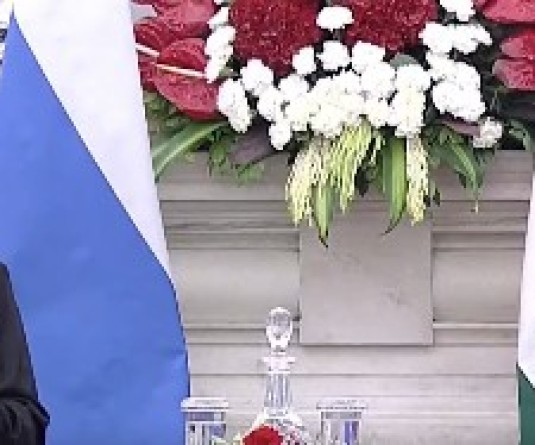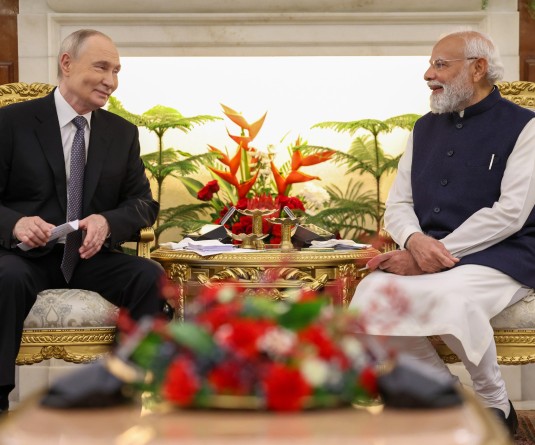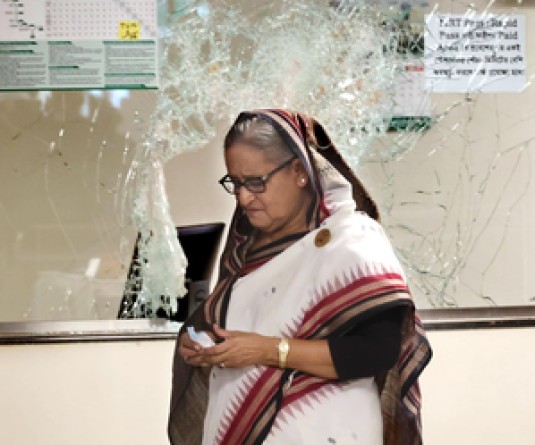
Italian Premier Silvio Berlusconi delivers his speech at an Italian Republican Party, PRI, meeting in Rome on Saturday, February 26. (AP Photo)
MILAN, February 28 (Reuters): The trial of Prime Minister Silvio Berlusconi on tax fraud charges resumed on Monday, the first of three cases to be revived after Italy's top court stripped him of his immunity from prosecution.
Berlusconi was not present for the resumption of the trial, the first showdown in a battle with the judiciary that will dominate Italian politics in coming months, including a new trial on charges of paying for sex with a minor.
Monday's case involved the acquisition of television rights by Italy's biggest private broadcaster Mediaset, the crown jewel in Berlusconi's vast business empire. The premier and other Mediaset executives are accused of inflating the price paid for purchasing TV rights via offshore companies controlled by Berlusconi and skimming off part of the sums declared to create illegal slush funds.
Berlusconi denies all wrongdoing and says politically motivated leftist magistrates are out to destroy him. After preliminary procedures, the trial was adjourned until April 11. Berlusconi's lawyer Niccolo Ghedini said the prime minister would "likely" attend that hearing.
Speaking at a political event in Milan as the hearing was ending, Berlusconi made no direct reference to the trial but repeated an often-used jibe at magistrates that he has undergone more trials "than anyone in the history of the universe." The Milan trial was effectively put on hold for a year but is now resuming after the constitutional court stripped Berlusconi of automatic immunity from prosecution.
Two related trials will recommence in early March while a separate case, in which Berlusconi is accused of paying for sex with an under-aged nightclub dancer and abusing the powers of his office to try to cover up the affair, begins on April 6. Under Italian law, a defendant is not required to attend trial but most do.
The trials come at a delicate juncture for the 74-year-old conservative premier. His mounting judicial woes and Italy's sluggish economy are weighing on his popularity.
On February 13 an estimated one million protesters -- mostly women -- took to the streets demanding his resignation and, for the first time since he triumphantly returned to power in 2008, some opinion polls show the chronically divided center-left opposition edging ahead if early elections were held. But at the same time he has managed to push back the prospect of early elections by beefing up his parliamentary majority, which had been cut to a handful of votes after last year's split with longtime ally Gianfranco Fini and his supporters.
Having lured back several lawmakers from Fini's breakaway movement, Berlusconi appears to have regained the upper hand -- even if by a narrow margin. On Sunday, he vowed to see out his term until it ends in 2013, saying early elections would hurt heavily-indebted Italy's government bonds, and pledged a sweeping reform of the judiciary which he accuses of trying to oust him from power.
Berlusconi was not present for the resumption of the trial, the first showdown in a battle with the judiciary that will dominate Italian politics in coming months, including a new trial on charges of paying for sex with a minor.
Monday's case involved the acquisition of television rights by Italy's biggest private broadcaster Mediaset, the crown jewel in Berlusconi's vast business empire. The premier and other Mediaset executives are accused of inflating the price paid for purchasing TV rights via offshore companies controlled by Berlusconi and skimming off part of the sums declared to create illegal slush funds.
Berlusconi denies all wrongdoing and says politically motivated leftist magistrates are out to destroy him. After preliminary procedures, the trial was adjourned until April 11. Berlusconi's lawyer Niccolo Ghedini said the prime minister would "likely" attend that hearing.
Speaking at a political event in Milan as the hearing was ending, Berlusconi made no direct reference to the trial but repeated an often-used jibe at magistrates that he has undergone more trials "than anyone in the history of the universe." The Milan trial was effectively put on hold for a year but is now resuming after the constitutional court stripped Berlusconi of automatic immunity from prosecution.
Two related trials will recommence in early March while a separate case, in which Berlusconi is accused of paying for sex with an under-aged nightclub dancer and abusing the powers of his office to try to cover up the affair, begins on April 6. Under Italian law, a defendant is not required to attend trial but most do.
The trials come at a delicate juncture for the 74-year-old conservative premier. His mounting judicial woes and Italy's sluggish economy are weighing on his popularity.
On February 13 an estimated one million protesters -- mostly women -- took to the streets demanding his resignation and, for the first time since he triumphantly returned to power in 2008, some opinion polls show the chronically divided center-left opposition edging ahead if early elections were held. But at the same time he has managed to push back the prospect of early elections by beefing up his parliamentary majority, which had been cut to a handful of votes after last year's split with longtime ally Gianfranco Fini and his supporters.
Having lured back several lawmakers from Fini's breakaway movement, Berlusconi appears to have regained the upper hand -- even if by a narrow margin. On Sunday, he vowed to see out his term until it ends in 2013, saying early elections would hurt heavily-indebted Italy's government bonds, and pledged a sweeping reform of the judiciary which he accuses of trying to oust him from power.






